Planning a trip to Greece? Here are some things to know about Greece before you go. Greeks take them for granted, but visitors may be puzzled, surprised, or even shocked!
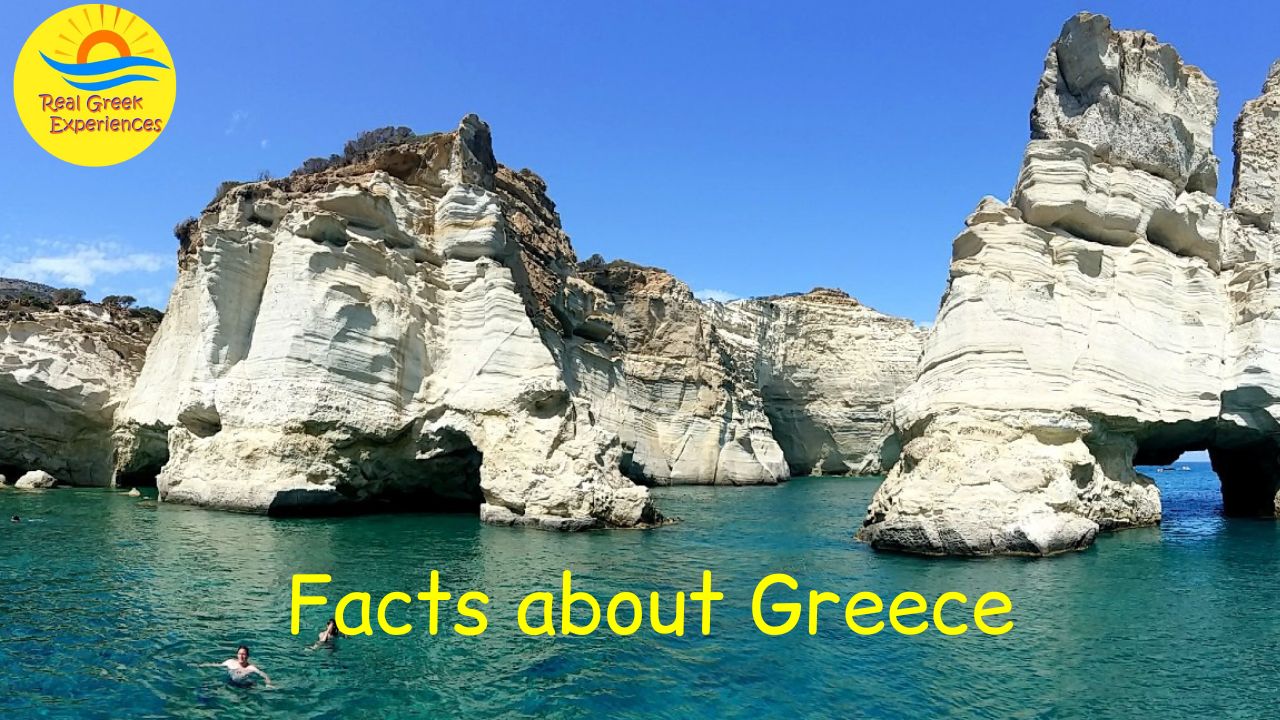
What you should know before visiting Greece
Foreign visitors are often surprised when they travel to Greece. Ask anyone who’s visited Greece, and they’ll tell you that their experience was interesting, to say the least!
Greece is one of the EU countries and is classified as Western Europe. Yet, due to its long history and unique geography, it’s very different to most European countries that you may have visited.
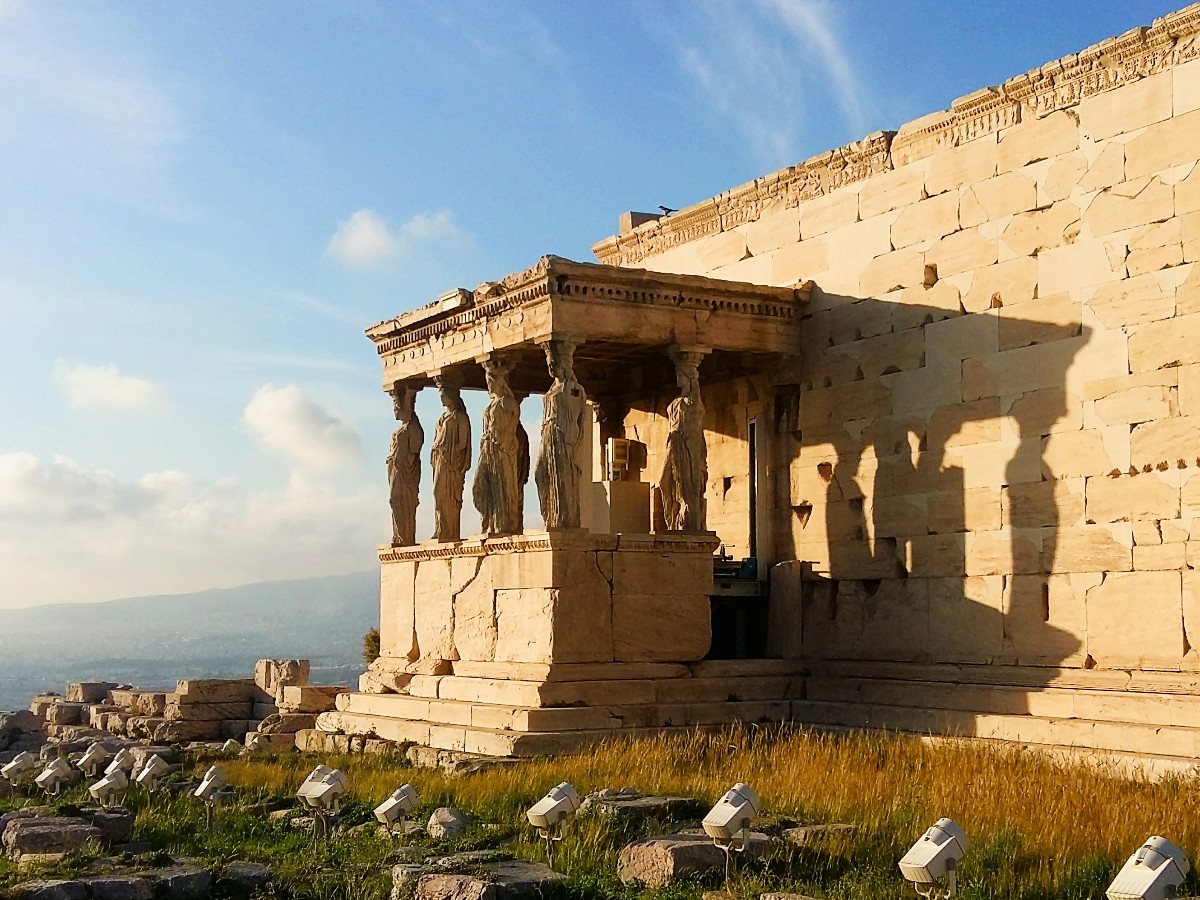
So, here are some basic facts and fun things to know about Greece before you visit! Knowing these in advance will help you avoid any surprises, and will help you make the most out of your trip.
1. Greece is a small country located in Southeast Europe
Greece is a small country located in Southeast Europe. It occupies a land area of 131,960 sq km (50,950 sq mi), which means it’s only slightly bigger than New York State. Its population is approximately 10.5 million people.
Greece shares its northern borders with Albania, North Macedonia, Bulgaria, and Turkey. Towards the east, south and west, it is surrounded by the Mediterranean Sea.
2. The capital city of Greece is Athens
Athens, the Greek capital, is Greece’s largest city, and one of the oldest continuously inhabited big cities in Europe. It is a bustling metropolis of almost 4 million people, with plenty of neighbourhoods, pedestrianized areas, markets and shopping areas to explore.
What makes Athens so interesting is its millennia of history. Athens is mainly famous for the ancient ruins, but you will also see lots of Byzantine churches, a few neoclassical buildings, and quaint neighborhoods like Anafiotika.
However, the vast majority of buildings in Athens are modern blocks of flats, many of which will seem rather unappealing at first. Street art and graffitti is also common.

This rather unique combination of many architectural styles, makes Athens what it is today!
The Athens international airport, Eleftherios Venizelos (ATH), receives thousands of flights from all around the world. Athens also has a large port, Piraeus. Hundreds of Greek ferries connect Piraeus with most of the Greek islands, and there’s also a busy cruise port.
Here’s some insight about overtourism in Athens.
3. Greece has thousands of islands and a huge coastline
Greece has, literally, thousands of islands! They are organized in different Greek island groups, such as the Cyclades, the Dodecanese and the Sporades.
Greece’s largest island is Crete, with over 600,000 residents. Most of the small islands are uninhabited, but there are well over 100 inhabited islands in Greece.
Some of the most popular Greek islands include Santorini, Mykonos, Paros, Rhodes, Kos, Kefalonia, Zakynthos and Skiathos. They are all unique, and each of them has its own devoted fans!
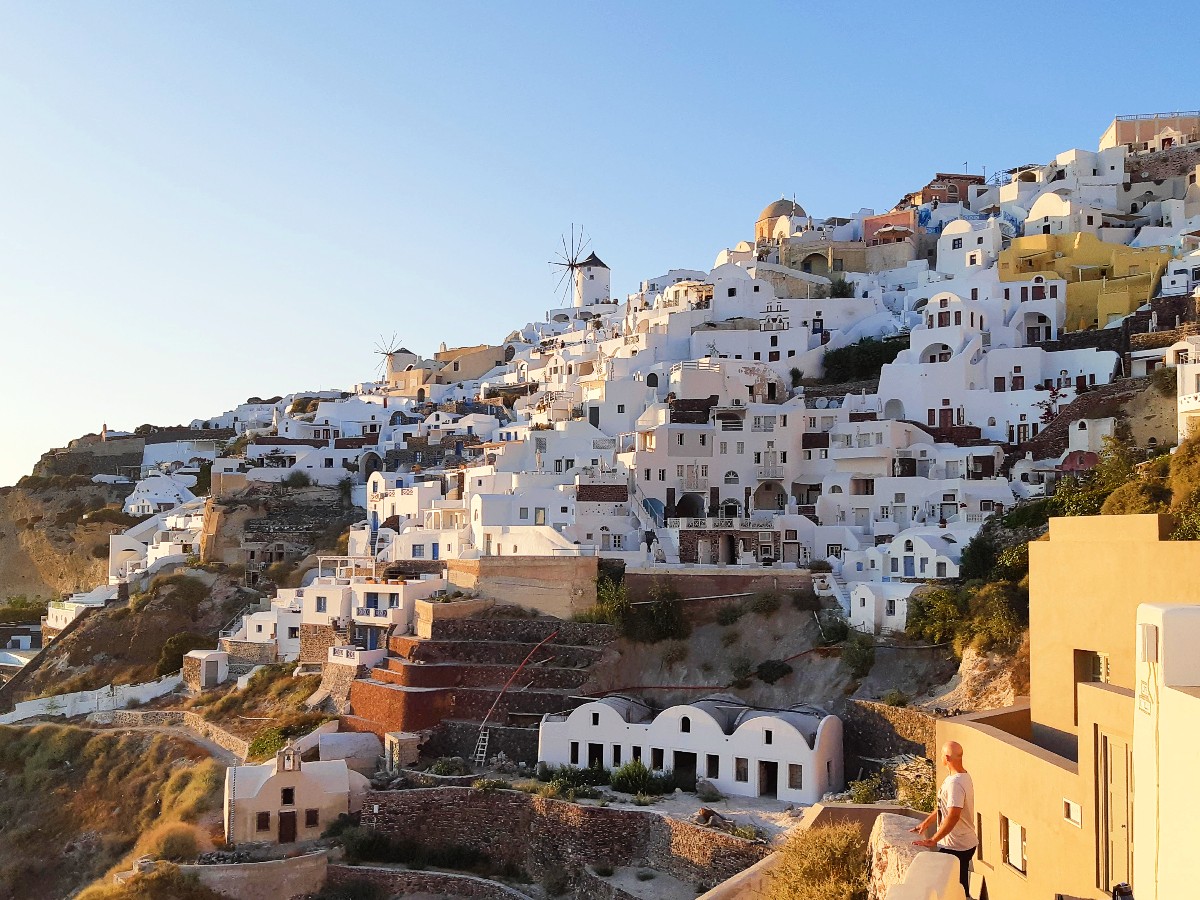
Connections between the different island groups are not always straightforward. If you want to go island hopping in Greece, it’s best to travel between islands belonging to the same group. Here are a few more tips on how to plan your Greek island hopping trip on your own!
You can check routes and book your tickets for all Greek ferries here: Ferryscanner.
Last, but not least: owing to its large number of islands, Greece has a huge coastline of 13,676 km (8,498 mi)! Much of this is occupied by beautiful beaches, but you will also come across sea coves, water caves and imposing cliffs.
4. Mainland Greece is very mountainous
Many first-time visitors are unaware that most of Greece is actually on the mainland. In fact, the Greek mainland is full of picturesque villages and archaeological sites, and it’s surprisingly mountainous!
As an example, the famous Ancient Delphi, Ancient Mycenae, Ancient Epidaurus and Meteora Monasteries are all on mainland Greece.
The highest mountain in Greece is Mt Olympus. At a height of 2,917 metres, Mitikas peak was the ideal base for the Ancient Greek Gods!
5. Anywhere you go in Greece, you will find lots of stairs
Here’s another thing that many first-time visitors don’t realize. Almost anywhere you go in Greece, you will find lots (and lots) of stairs.
This extends to many popular places in Greece, including the islands. The famous Santorini, for example, is full of stairs. Hotels and rooms with a view to the caldera are usually at the end of a long staircase.
Symi, a small island close to Rhodes, is even worse. But the views from the top of the stairs are always worth it!
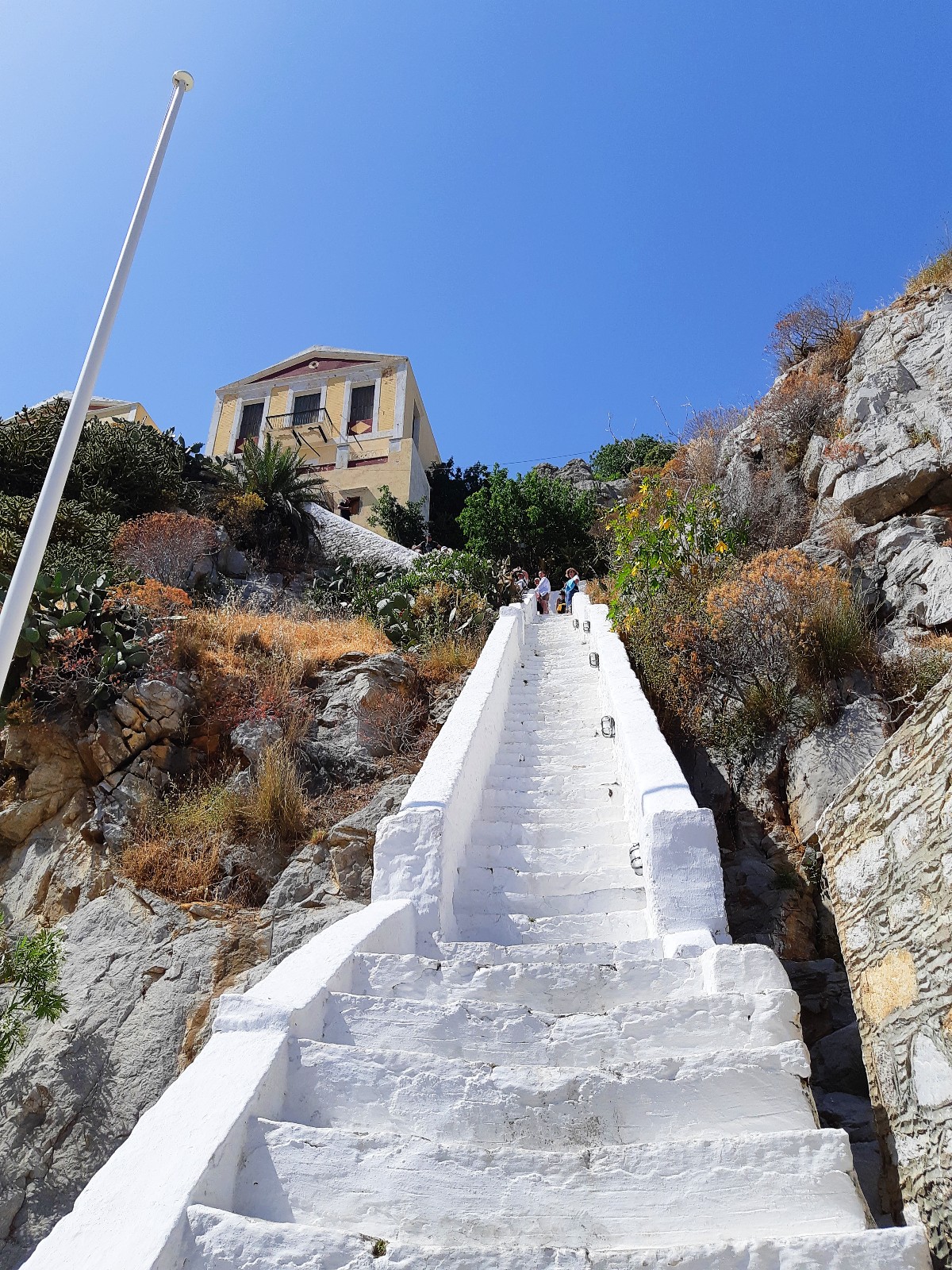
If you have mobility issues, or if you are travelling with young children, make sure you read your hotel’s description carefully. And whatever you do, don’t forget to bring some comfortable shoes. I love Teva sandals, as they are ideal for Greece.
6. Greece has a rich history which goes back thousands of years
Greece is an ancient land, and the Greek civilisation dates back thousands of years. Some of the ancient monuments, like the Acropolis, are still standing as a testament to its long history.
With that said, modern Greece as we know it today has only been around for a few decades! The Hellenic Republic, the official name that Greece goes by, was established after the Greek War of Independence in 1821. Since then, the country expanded, and took its present form in 1948.
Some of the most influential philosophers who shaped Western culture, such as Socrates, Plato and Aristotle, were Greek. This is why Greece is often referred to as “the cradle of civilization”.
Also, have a look at this article about the Delphic Maxims. They are short, inspiring quotes which were written in the 5th century BC, many of which are still relevant today!
7. Greece has four seasons: spring, summer, autumn and winter
Contrary to what some people think, Greece is not a tropical country where it’s warm year-round. We have four seasons: spring, summer, autumn and winter.
While Greece’s climate is generally mild, temperatures vary a lot throughout the year. Summers are hot, and temperatures can sometimes exceed 40 C (104 F). On the other hand, winter temperatures often drop below 0 C (32 F), and snow is not uncommon.

Northern Greece is usually colder than the south and the islands. On the other hand, many islands are windy, even in summer!
For more weather information, have a look at these articles:
- Best time to visit Greece
- What to pack for Greece for every season
- Meltemi winds in Greece
- Hottest islands to visit in October
- Athens in November
8. The only accepted currency in Greece is the Euro
Greece joined the European Union back in 1981. At the time, the Greek currency was the drachma. In 2002, the European currency, the Euro, was introduced.
These days, we only use Euros for our transactions in Greece. If you are coming from a country outside the Eurozone, please check with your bank the best way to make purchases in Greece.
Hotels, restaurants and shops in Greece accept credit cards and debit cards. Unlike Visa and Mastercard, which are widely accepted, American Express is not common in Greece.

You will find that many smaller businesses, like family hotels or local tavernas, prefer cash. You will also be likely to need cash for certain transactions, such as groceries, street vendors, some bus / museum tickets or when tipping in Greece.
The bottomline? Make sure you have some euros with you. Try to have some coins and small notes, if at all possible, especially for inexpensive purchases.
Finally, when it comes to haggling, it’s not as common as it used to be in the past. However, independent vendors might still offer a better price if you are buying more than one items. So if you are looking for souvenirs, consider getting them from the same place, and you might get a small discount.
9. The local language of Greece is Greek
Greek is the official language in Greece. The Greek language has been around for several millennia, but has evolved and changed a lot throughout the centuries.
Visitors will find that most Greeks speak English to one degree or another. In fact, Greeks who work in the tourism industry often speak French, Spanish, Italian, German, Russian and maybe other languages.
Still, if you are visiting Greece, it’s a good idea to learn a few Greek words and phrases. Even though it will all be Greek to you, it will earn you a few smiles, and perhaps some treats!

You can start with trying to learn the Greek alphabet. It’s not as hard as it looks, plus you may have seen some of our squiggly letters before – especially if you have studied Math or Physics.
Also, have a look at these useful Greek words and phrases. And, if you want to take it a step further, here’s how to swear like a Greek 🙂
10. The prevailing religion in Greece is Christianity (Greek Orthodox)
The official religion in Greece is Greek Orthodoxy. This is a branch of Christianity which has several differences to both Roman Catholicism and Protestantism, which are more common in the west.
Religion is a really important aspect of Greek culture. There is an incredible number of Greek Orthodox churches and chapels all around the country. And even though many Greeks are not overly religious, the majority respects the Greek Orthodox customs and traditions.

Here is some more information about religion in Greece:
- Religion in Greece
- Greek Easter traditions
- Christmas in Greece
- Namedays in Greece
- Independence day in Greece
Also, have a look at this guide about celebrations and public holidays in Greece.
11. Greek people are very friendly
It might sound like a stereotype, but it’s true: Greek people are known for their warmth and hospitality. If you want to get the most out of your trip to Greece, try to meet locals and learn about their regional customs and unique traditions.
Note: You may have been advised to bargain hard when buying Greek souvenirs. You may have read that taxi drivers might try to charge you a high “tourist price”, or that waiters will try to add a euro or two to your account.
While I cannot promise that none of this will happen to you, I firmly believe that most Greeks are honest. So use your common sense, but don’t think that everyone who comes across as friendly is out there to get you. They are probably trying to help!
12. Some Greeks still smoke indoors
Until late 2019, smoking indoors was very common in Greece. Although the anti-smoking law came into effect in 2010, it had not been widely applied in bars, cafes and restaurants. This old sign below says that smoking is allowed!
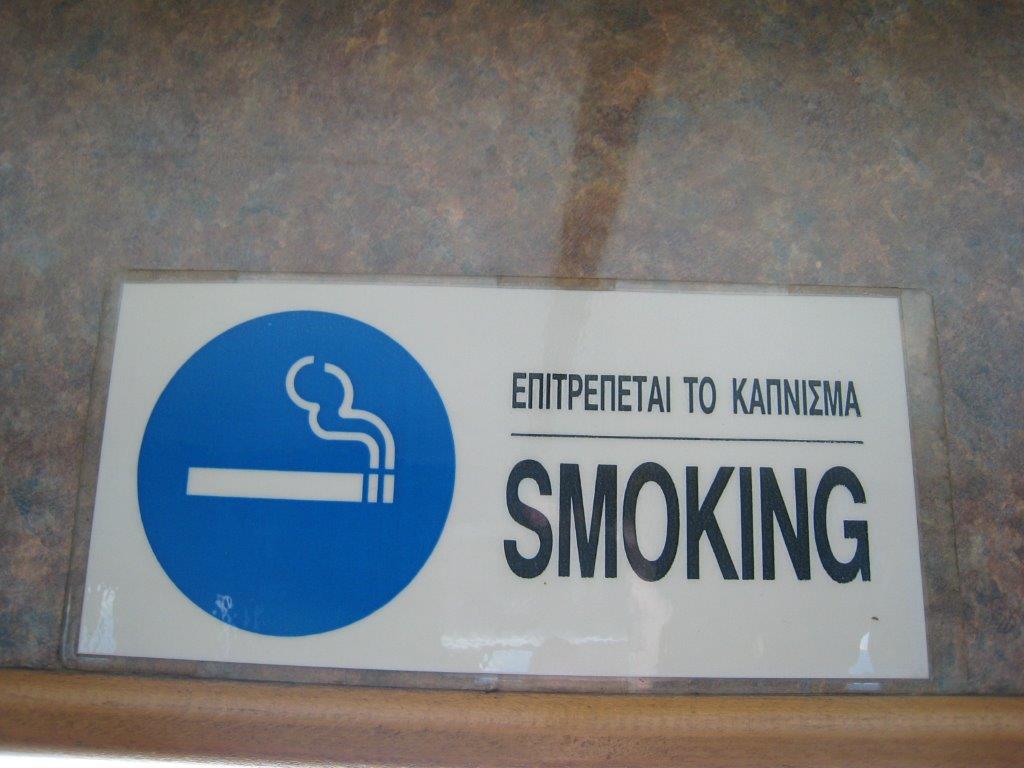
In late 2019, the anti-smoking law was finally enforced. However, people still smoke a lot in Greece, and not everywhere you go will be entirely smoke-free.
Smoking is allowed in designated open-air areas in cafes and Greek tavernas. It’s also allowed in outdoors spaces such as parks, beaches and outdoors cinemas, with very few exceptions. And don’t be surprised if you see one or two people smoking indoors in a restaurant or bar.
In any case, if you are visiting Greece in summer, smoking shouldn’t be much of an issue. Just sit outside, avoid sitting next to smokers, and enjoy the lovely weather!
13. Sometimes things won’t go to plan
A delayed ferry, a public transport strike, a waiter who forgot your order, an ATM that won’t work with your credit cards. You might encounter one or more of these situations while visiting Greece – or anywhere for that matter.

My best advice – if something unexpected occurs, don’t let it discourage you from enjoying your Greek vacation. It will all work out in the end!
In fact, Greek culture goes hand in hand with what we call siga-siga (slowly slowly). Believe it or not, “Greek time” is something that many repeat visitors are actually after!
14. Cars in Greece don’t stop at zebra crossings
One of the things you should know about Greece, is that pedestrians rank low on the food chain. If you assume that cars will stop for you to cross a zebra crossing, please think again!
Apart from the zebra crossings at the Athens airport, very few drivers in Greece respect the zebra crossing rule. I’ve seen it happen a few times, but I always find it surprising.

So, whenever you need to cross the street, please look carefully, and cross quickly. In fact, the same applies even if there is a “green man” indicating you can cross.
In a nutshell, always assume that the car has the right of way. And remember that Greeks drive on the right side of the road!
By the way, if you are planning to rent a car in Greece, have a look at Discover Cars. It’s an online platform where you can compare car rental companies and hire a car at very competitive prices.
15. It’s very common for cars and motorbikes to be parked illegally
While in Greece, you will most likely spot illegally parked cars and motorbikes. You may see cars parked on the pavement, under a clear “No-parking” sign, or even on the street, blocking other parked cars.

This is common everywhere – Athens, the mainland, and also many Greek islands. However, if you are a tourist, always make sure you park legally, as parking fines can be pretty high.
For more road rules and driving tips, have a look at this article about driving in Greece. There’s also information about the legal speed limit, and photos of Greek roads and national highways.
16. You shouldn’t flush toilet paper down the toilet!
You may have grown up in a country where toilet paper goes down the toilet. This is not always the case in Greece – in fact, it’s rather rare.
Yes, that’s right: The sewage system in the majority of Greek buildings is old! You will need to put the toilet paper in the little bin next to the toilet. I’m not joking!

You can probably guess what will happen if you don’t, and trust me, you won’t like it. A clogged toilet is no fun.
Whereas this is not the case for all buildings and hotels, it’s always best to ask. When in doubt, just use the bin!
Here is my complete guide on why you shouldn’t flush toilet paper in Greece.
17. Greece has plenty of naturist-friendly beaches
Naturism started becoming popular in Greece, especially in Mykonos, in the late 1960s. After Greece joined the EU, thousands of visitors were happy to spend their summer holidays fully enjoying the Mediterranean sun.
Naturism and free camping on isolated beaches throughout the country became quite common. Although both are technically illegal, they are well tolerated in many areas.
They are even the done thing in designated beaches around the country. Going topless for women is also fairly common on non-naturist beaches.
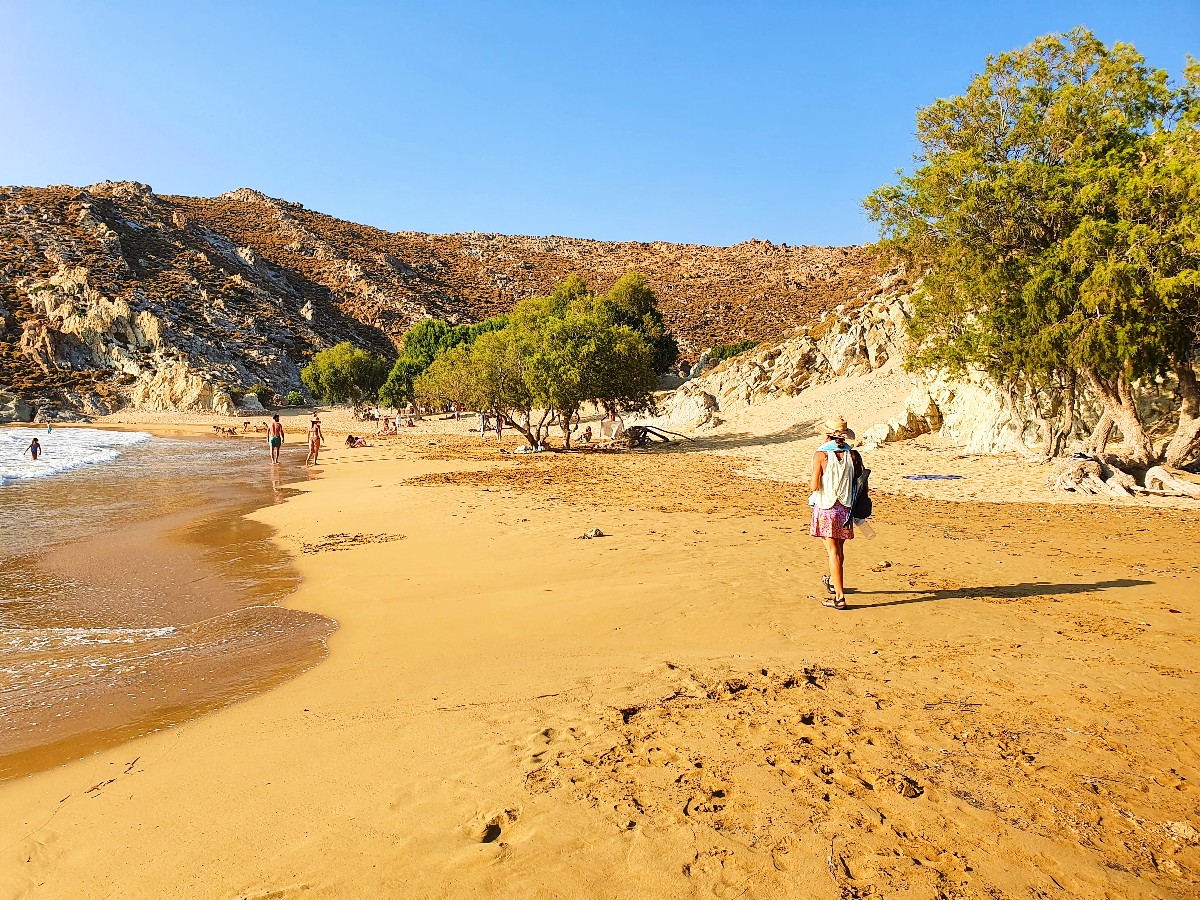
For obvious reasons, most of the naturist beaches in Greece are not easily accessible. Unless you go off the beaten track, you are unlikely to see something you didn’t intend to. But if you are in constant search of isolated bays, you will probably come across some people without their swimsuits.
If you decide to give it a go, make sure you don’t forget your sunscreen. Apply liberally, especially on the body parts that haven’t seen the sun in a while.
18. Greeks are passionate about Greek food
If you want to upset a Greek person, you just need to imply that Greek cuisine is not the best in the world. Greeks are very proud of their culinary tradition, and the Mediterranean diet is considered to be one of the healthiest in the world.
Greeks take their food seriously, from the ingredients to the preparation and cooking process. It’s all about quality, taste, and freshness. Often, the emphasis is on vegetables that has come straight from the garden that morning, or fish which was caught an hour ago.

Greek cooks take pride in the traditional recipes they have kept alive throughout the years. It’s not unusual to find secret family recipes which have been passed down from generation to generation.
Apart from souvlaki, moussaka, feta cheese, tzatziki, baklava and Greek salad, you will find dozens of Greek dishes that are worth tasting. Greek cuisine varies from region to region, so try different foods when you travel around the country.
Two of the best places to go for Greek food are Thessaloniki and the island of Crete. Wherever you go, consider taking a food tour, where you will be introduced to our dishes and food culture.
Have a look at these other food articles:
- 50 popular Greek dishes
- How to order food in Greece – includes information if you are allergic to gluten, nuts etc!
19. The Greek coffee culture is a lot more than coffee
I cannot stress enough the importance of the Greek coffee culture for Greek people! It’s not really about the coffee per se. It’s about meeting a friend or two and going for a chat for a couple of hours. It’s an aspect of our siga-siga culture, which I invite you to embrace when you travel here.
During the crisis era back in 2008, I met dozens of visitors who were surprised at the number of Greeks sitting in coffee shops. The truth is, staying at home wasn’t going to help get rid of the crisis. For most people, there was nothing wrong with meeting friends for a coffee.
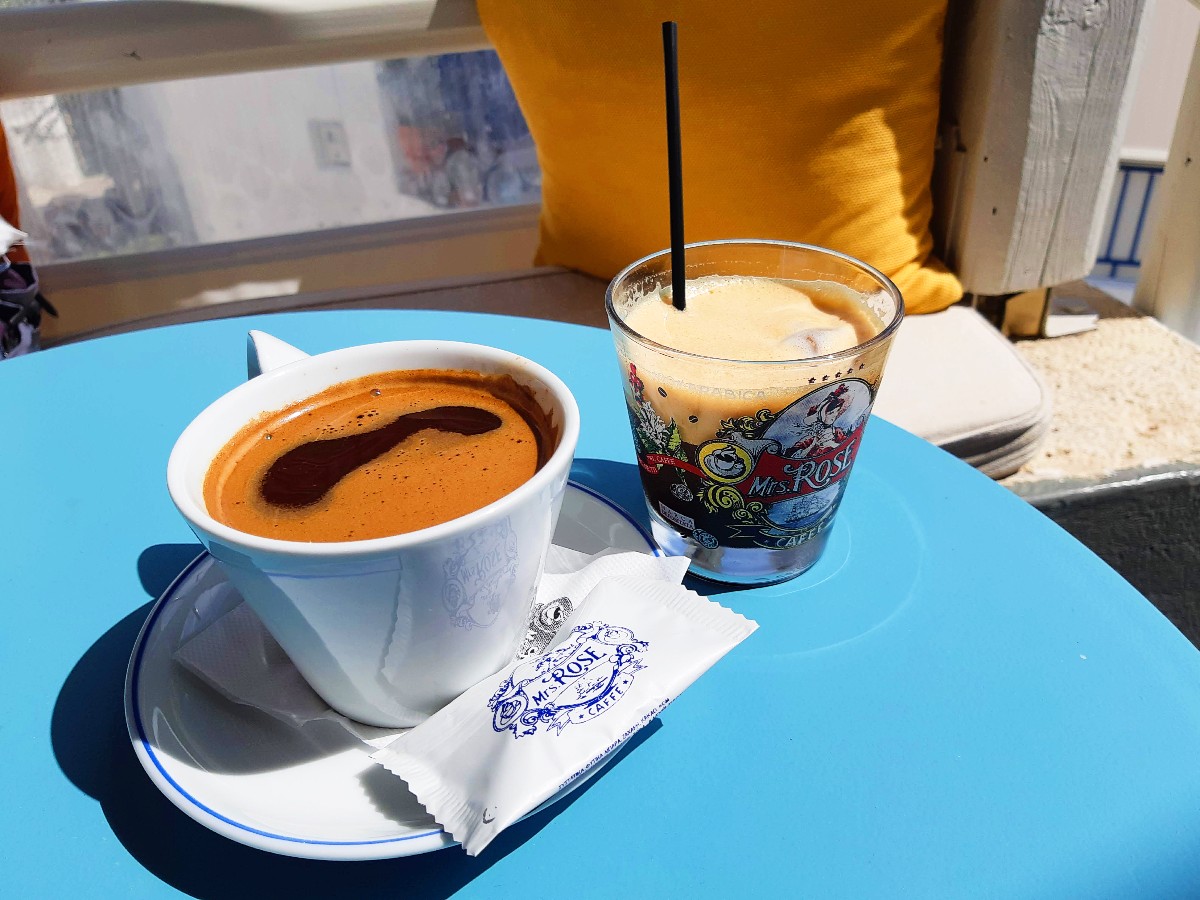
For a Greek, there’s nothing better than enjoying an iced coffee in the sun! You’ll see hundreds of locals sitting out for a coffee in Athens on a Sunday – or on any other day, for that matter.
Take your pick from a cold frappe (instant coffee with ice cubes), a freddo espresso, a freddo cappuccino, or another fancier alternative. And even if the idea of a cold coffee doesn’t excite you, give it a go anyway – you might be surprised.
If you aren’t a coffee drinker, check out this long list of Greek drinks!
20. Tap water is not always OK to drink
Many tourists ask if they can drink tap water when in Greece. The answer is, “it depends”.
Tap water is generally fine to drink in the large cities like Athens or Thessaloniki, as well as the mainland. However, if you are going to the islands, it’s probably best to stick to bottled water.
I’ve been to over 60 Greek islands now, and I always ask the locals if I can drink tap water. Most times, locals discourage visitors from drinking tap water, and they drink bottled water themselves.
Bottled water is inexpensive in Greece, especially when compared to other European countries. By law, a small (500 ml) bottle of water shouldn’t cost you more than 50 cents – though some places might charge up to a euro. A large bottle is rarely over 50 cents when you buy it at a supermarket.

In addition, there are often water fountains on the islands where you can re-fill your bottle for free or for a small fee. Ask around, as it will help you cut down on the number of plastic bottles you buy!
Here’s my full guide: Can you drink tap water in Greece?
Last tip: If you are visiting in the high season, remember to drink lots of water. The last thing you want to get is dehydration due to the warm weather!
FAQs about Greece
People planning a trip to Greece often ask questions similar to these:
What are 5 interesting facts about Greece?
Here are a few interesting facts about Greece: (a) Greece has over 6,000 beautiful islands (b) Greece has one of the longest coastlines in Europe (c) Greece has a history of several thousands of years (d) Millions of Americans and European tourists visit Greece every year (e) Eating and drinking is a huge part of the Greek culture.
What is Greece best known for?
Greece is best known as the birthplace of democracy and Western civilization, but also as a country with fantastic beaches and delicious food. In addition, Greek people are known to be super friendly and hospitable.
What do I need to know before traveling to Greece?
If you are planning to visit Greece, make sure you do some research on weather. While the best time to go is considered to be the summer, July and August are very hot. You can consider traveling to Greece in the beginning or end of the tourist season – May, June or September.
What should I know when visiting Greece?
If you are planning to explore many different places in Greece, you should know that getting from one to another isn’t always straightforward. One of the best tips is to stick to just a few regions, depending on the amount of time you have.
What’s unique about Greece and the Greek islands?
Although it is a small country, Greece has one of the longest coastlines in Europe! Popular destinations include the region called Peloponnese, in mainland Greece, and the islands of Santorini, Mykonos and Crete.
Is Santorini safe?
Yes! Santorini is a very safe place. Have a look at this guide: is Santorini safe and things to avoid.
More travel guides about Greece
Is that everything you need to know about Greece? Not at all, but hopefully it’s a good starting point. You’ll have to visit and experience Greece yourself! Here are a few more posts about Greece and Greek culture:
- How to experience Greece from A to Z
- Movies about Greece: A Big Fat List of Greek Films
- Interesting facts about the Greek flag
- All you need to know about ancient Greek theatres
- Beautiful places in Greece
- Helpful websites for expats in Greece
- The best SIM card for Greece
- How to avoid mosquitoes in Greece
- Things that went wrong during my Greek island holiday
 Hi, I’m Vanessa from Athens! I love sharing Greece travel tips and helping people discover more about my country. If you can think of any other things to know about Greece before you visit, please leave a comment below. Follow me on FB and Instagram for more Greece-related info!
Hi, I’m Vanessa from Athens! I love sharing Greece travel tips and helping people discover more about my country. If you can think of any other things to know about Greece before you visit, please leave a comment below. Follow me on FB and Instagram for more Greece-related info!

This and truly all the articles on this website are great! I love your honesty, it helps me get a real sense of Greece and Greek people! Thank you so much! ευχαριστώ
Glad it helps! Let us know if there’s anything else you’d like to read about!
The website and your articles are so incredibly helpful. I hardly have time to read all the great information you provide – I will definitely recommend it to anyone traveling to Greece!
Thank you so much Kim!!
I am so glad I found your website! It is so helpful. I plan on spending a month in Greece next April. I am sure you have a link I missed, but are there particular shopping items I should look for? Types of souvenirs or things that are special to Greece?
Heheeeeh here is the article you are looking for! Souvenirs in Greece. Also, have a look at this guide about shopping in Athens. Hope this helps!! Enjoy your time, April is a fantastic month to be here!
“One of the things you should know about Greece, is that pedestrians rank low on the food chain” 🤣🤣🤣🤣🤣
😀 😀
Thank you for compiling such an excellent article. There’s loads of great information here. It’s a massive help to this first time visitor to Crete.
Thank you so much!